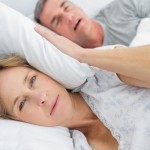
The answer to this question may be related to conditions like seasonal allergies or minor ailments such as a cold. However many people snore due to a physical abnormality that must be identified before an appropriate solution can be put into place.
Physical reasons why people snore include ..
- snoring because of a lack of muscle tone in the tissue of the soft palate and throat. During sleep the muscles relax and the soft palate partially blocks the airway and sets up a vibration in the throat. An elongated uvula – that piece of triangular tissue that hangs from the back of the roof of the mouth – can obstruct airflow and often be the cause for why people snore.
- nasal problems including deviated septum or narrow nostrils leading to snoring.
- when a person sleeps and the tongue falls back towards the throat. Again, this partially blocks the airway and causes the vibration known as snoring.
Snoring when the mouth is open is often related to the soft tissue in the throat. Stop snoring exercises can help this condition.
Snoring when the mouth is closed is more likely to be related to the position of the tongue.
Snoring when sleeping on the back is quite common and can frequently be remedied by improved sleeping posture, sleeping on the side, or the use of special ‘stop snoring pillow’.
Obstructive Sleep Apnea
Snoring can also be a symptom of the potentially life-threatening condition obstructive sleep apnea. While snoring is caused by a narrowing of the airways, during OSA episodes the airway becomes completely blocked and the sufferer is forced to wake to begin breathing again. These episodes can occur several hundred times during the night and the sufferer may not be aware of them. However, a sleep apnea sufferer will frequently be tired during waking hours.
OSA must be identified and treated professionally.
Whilst snoring is a common symptom of obstructive sleep apnea, snoring itself is not life threatening. It can, however, be very annoying, not only for the snorer but especially for the snorer’s partner.
There are many treatments for snoring that are worth trying before surgery.
Snoring Chin Strap
For those who snore due to a collapsing soft palate or a tongue that falls back partially blocking the airway a snoring chin strap is worth trying. The chin strap holds the mouth closed and the lower jaw in a slightly forward position. This assists in keeping the airway open when the muscles relax during sleep. Click here to read our review on the stop snoring chin strap.
Snoring Mouth Guard
The snoring mouth guard works in a similar manner to the snoring chin strap and also holds the lower jaw forward.
Stop snoring exercises
Exercises to stop snoring are a highly recommended and safe method of reducing or stopping snoring.
Medical intervention may ultimately be required for habitual snorers to get a good night’s sleep, however, non-interventionist methods are preferred. Research suggests that the tongue plays a particular role in creating and intensifying a person’s snore and in this case medical advice is highly recommended.
Snoring caused by nasal congestion can frequently be relieved by taking decongestants, although you may want to consult your doctor to choose a particular decongestant that is appropriate for your condition. Some decongestant nasal sprays can become habit forming quickly.
Snoring can affect relationships, increase daytime fatigue, and can be a sign of more serious health conditions. There are many reasons why people snore, and fortunately there are treatments available to ease snoring and relieve these associated conditions.






